Introduction
The tragedy of the 9/11 had a significant impact on the economical development of the United States, as well as its role in the international relations. Ten years down the line, the occurrences of that day are still fresh in people’s minds. It is an incident that changed America’s history and image within a relatively short period of time.
In the aftermath of the 9/11, the United States had to face the challenges of the economical downturn, war on terror, oil crisis and threats form the newly arising superpowers, such as China. All of these issues are intertwined and cannot be viewed separately from the rest of the global situational context.
If the history of the 9/11 decade is written, the main themes to be covered in it would include the relative decay of the U.S. as a superpower which should be viewed in complexity of its preconditions and consequences. The U.S. economy, the military needs and strategies of the country, the oil crisis and the U.S. relations with other countries, China and the countries of the Middle East in particular, are the main themes which need to be considered in order to understand the main tendencies which took place in 9/11 decade.
Main predictors of the changes in the US position
The events of the previous decade had a significant impact on the US position in the world. The attitude of the world community towards the United States has undergone significant changes, and its status of unipolarity has been questioned. According to the data of the Gallup Website (2011), the number of people who are satisfied with the position of the US in the world has decreased since 2001 to 2011 with the figure declining from approximately 70 percent to 35 percent (Appendix 1).
Furthermore, according to another survey conducted by Gallup (2011), the rating of the US which was unfavorable in the eyes of the world community has increased from 26 percent in 2001 to 49 percent in 2011 (Appendix 1). Additionally, the US rating of favorability in the eyes of the world community has declined from 73 percent to 50 percent in the years 2001 and 2011 respectively (Appendix1).
According to Joffe (2009, p.23), in the aftermath of the 9/11 attacks and due to the rise of other superpowers, America loses its points in the geopolitical marketplace. Particularly, the rise of China is recognized by Joffe (2009, p.23) as one of important predictors for the changes in the US position.
The economic development of the US and China within the latest decade
Within the 9/11 decade, significant changes took place in America’s economy due to the lack of certainty and the costs spent on the “war on terror”.
The effects of the 9/11 attacks upon the US economy can be seen from the changes in GDP which took place in the third quarter of 2001. In the first two quarters of 2001, the economy of the United States was on the rise with the budget surplus of $128 billion (Miley, 2011).
However, after the 9/11 attack and the decision to initiate the “war on terror”, the future well-being was questioned. The lack of confidence had negative effects upon the employment opportunities, investment decisions, export sector, businesses, enterprises, and other industries.
These changes had a significant impact upon GDP. As it can be seen from the data retrieved from CNN Money (2001), in the third quarter of 2001, the United States’ economy shrank with Gross Domestic Product (GDP) fell to 0.4% (Appendix 2). Moreover, the situation in the derivatives market and subprime mortgage crisis in 2008 resulted in the Great Recession which had negative effects upon the country’s economy.
The US government took measures for improving the existing state of affairs by developing the intervention strategies, such as the Trouble Asset Relief Program of 2008 and the economic stimulus package of 2009 which were rather costly and can be estimated at approximately $700 billion and $800 billion respectively (Miley, 2011). Therefore, revealing the gaps in security, the 9/11 attacks had a negative impact upon the reputation of the United States and its economical development.
Another influential factor affecting the US economy was the increased costs spent on the “war on terror” which have become a burden for the country’s budget. These expenses have been accelerated every year and currently estimated at approximately $3.7 trillion, and this figure is expected to reach $4.4 trillion in 2011 (Daily Mail, 2011).
Spending too much on the anti-terrorism war, the United States faced a burden of international debts. The enormous budget deficit also affected the credit rating of the country, which led to the measures imposed by Standard & Poor’s, namely changing the credit status of the United States from AAA to AA+ which caused further financial damage to the budget due to the increased costs of the borrowing procedures (Johnson, 2011).
The economical decline and strategies applied by the government had impact upon the position of the national currency, the US dollar. During the sub-prime mortgage crisis, the US dollar was depreciated because the Federal Reserve made attempts to cut interest rates. Regardless of the deficits in the US budget, many countries still purchase the US Treasury bonds to prevent their own currency from being depreciated.
In other words, it allows them to save their exports from declining if the price on their currency rises, making exports more expensive. On the contrary, the US dollar can be depreciated if other countries hold too much of their Treasury bond, rejecting to use the US dollar in their financial operations.
This can be seen form the example of the United Arab Emirates which preferred other currencies such as the Euro to the dollar to estimate the value of their commodities, oil in particular. Furthermore, Nigeria which is recognized as Africa’s top oil exporter converts more than 10 percent of its foreign reserves from the US dollars to the Chinese Yuan to control the value of their national currency (Hinshaw, 2011).
It shows that the developing countries put faith upon the rise of China. The depreciation and the declining popularity of the US dollar demonstrate the lack of trust to the United States in other countries.
China’s strategies aimed at liberalization of its economy had a positive impact on the level of economical development of the country. The growth of China’s economy has been significant over the latest few decades with an astonishing rise estimated at 9 to 10 percent per annum (Rachman, 2011, p.1).
This growth has been driven by several important factors, such as the development of the rural non-farming sector, massive inflow of foreign capital, promotion of trade, structural transformation and others. In 2002, for instance, China overtook the US as the world’s largest recipient of foreign capital for the first time (Wu, 2004, p.3).
Furthermore, in 2004, China overtook the US as the world’s leading exporter of information and communications technology (ICT) goods, and it is now the world’s leading exporter (OECD, 2004).
Although it is widely known that the China’s economy depends on exports heavily, especially to the US, it establishes relationships with Japan, Africa and other Southeast Asian countries to reduce its dependence upon the US (Amadeo, 2011). Therefore, the situation on the international arena changes and China gains more influence on the world economy.
Regarding the international relations between the United States and China which is recognized as a new superpower by some analysts, this relationship can be defined as mutual dependence.
On the one hand, China’s economy is dependent upon its exports to America. On the other hand, according to the latest data, China is one of the most important holders of the US debts. According to the data of the US Department of the Treasury (2011), China is now the top holder of the US government debts with liabilities estimated at $1173.5 billion (appendix 3).
Hence, with the growing strength of the Chinese economy and China being the United States’ largest foreign creditor, the potential of the Chinese Yuan to become the next major currency is rather high. However, it is vital for China to keep the Yuan from appreciating because a stronger national currency can increase the prices on export and do harm to the Chinese economy which is highly dependent upon its export sector.
The enhancement of military power in America and China
One of the most influential factors which allowed the United States to preserve its unipolar status of a superpower during a considerable period of time is its flexible military power and high technologies which did not have analogues until recently.
Analyzing the condition of the military power and the security agencies of the United States within the latest decade, it can be stated that there were a number of rises and falls in different aspects. In the aftermath of the 9/11 attacks, the US increased its military expenses on research, development, testing and evaluation of new and improved technologies to strengthen and enhance its military power.
During the previous decade, there were a number of advancements in the US military technologies, such as the maturation of Remotely Piloted Aircraft (RPA), also known as Unmanned Aerial Vehicles (UAVs) or, more generically, drones (Greenemeier, 2011). The number of drones, which can perform reconnaissance, surveillance and attack missions has been increased from 54 to more than 6000 since 2001, assisting the US’s military forces in their mission in the Middle East (Greenemeier, 2011).
Furthermore, apart from the drones, there are also others emerging technologies, such as the futuristic soldier-supporting exoskeletons and laser cannons provided to the US troops as weapons (Greenemeier, 2011). Therefore, it can be stated that the US increased costs spent on the research and development of new military technologies were beneficial for enhancement of its technologies and strengthening its army.
Along with the increased costs spent on research and development, another consequence of the 9/11 attacks and a part of the “war on terror” was the invasion in Iraq and Afghanistan which also required considerable expenses. Another influential factor which caused a tremendous increase of military costs was an oil crisis of 2008 (Appendix 4).
The decline in the America’s economical development and the increasing deficits in the countries budget and external credits inevitably lead to reduction of costs spent on various domains, including those of military expenses. Due to the US $14 trillion deficit the expenses on military, diplomatic and development budget will need to be cut.
On the other hand, this forced reduction can weaken the country’s ability to respond to the external hazards and ensure the national security (Quinn & Stewart, 2011). It is probable that the US may lose the “Arab Spring” opportunity to restructure its politics and support democratic forces emerging from nations, such as Egypt and Tunisia, due to the US massive deficit leading to the cut off of expenses (Quinn & Stewart, 2011).
China, with its rapidly developing economy and technologies, achieved noticeable success in enhancing its military power as well. The enhancement of the Chinese military power within the latest decade is seen as a threat to the US by Pollack (2007, p.635). As compared to 2001, China’s military expenses have been increased by nearly 200 percent, reaching an estimated amount of $150 billion in 2009 (Shanker, 2010).
The rise of the Chinese economy provided opportunities for the modernization of its military forces which can be seen from the launch of a tealth fighter program, new aircraft carriers, carrier-killing ballistic missiles, improved cyber warfare techniques and a doctrine of “space dominance” (Foster, 2011).
Although Chinese military power is still far behind the US, the attempts of China to improve its military power and enhance the national security and ability to respond to the external threats have been rather successful. The enhancement of its military power is a long-term goal pursued by China, and the first results of this national strategy can already be seen.
Thus, with its success in improving its military technologies and strategies, China can be viewed as a strong competitor to the US which is losing its unprecedented advantage due to the economic decay and a number of other factors.
Oil crisis as an influential factor affecting the world economies
Along with the global war on terror, the oil crisis was an important influential facto affecting the economies of most countries. According to Klare (2011), the oil decline is intertwined with the economical decay of the United States.
Oil is a natural resource that is non-renewable and hence, valuable and significant to the world, both politically and economically. Control over the oil supply can have a significant impact on the role of a country in the international arena. The Middle East is well known for its oil which accounts for at least two-thirds of the world’s resources, particularly in Iran, Iraq, Saudi Arabia, and the Gulf States.
Hence, the battle for resources such as oil, will thus, challenges the US both politically and economically. Since the last decade, political relationships between the US and the countries of the Middle East countries, such as Afghanistan and Iraq, have been deteriorated due to the ‘war on terror’.
The decision of the United States to invade into Afghanistan was predetermined with the anti-terrorism strategies, on the one hand, and the abundance of natural resources in this country, and oil among them, on the other hand. Furthermore, the Iraq war was seen as the US strategy to gain access to the world’s largest and cheapest oil reserves, as well as stabilizing the position of the US dollar.
Therefore, the history of the anti-terrorism war is inseparable from the history of the oil consumption and control over the largest storages of non-renewable resources. If the history of the 9/11 decade is written, its main themes would be the wars on terror and for the oil and the relationships between America and the countries of the Middle East.
Depending upon the perspective chosen by historians, the strategies implemented by America can be defined as humanitarian and peacemaking in terms of combating the world terrorism or harmful in terms of invading into the countries with abundant natural resources for the purpose of gaining control over them.
The economic rise of China as a new world superpower is another important topic to be touched upon in the history of the 9/11 decade. The strategies implemented by China in solving the problem of oil supply clearly demonstrate the level of development of this country, as well as the main directions of its international policies.
The Chinese government has been purchasing oil from countries like Saudi-Arabia, Russia, Iran and Sudan instead of the open market where prices changes are being controlled. Additionally, China has also been seeking for the alternatives in Africa and Latin America to safeguard its economy in case if the Persian Gulf and Caucasus decide not to sell oil to Asia.
Therefore, exploring and seeking alternatives for cheaper oil reserves instead of being dependent upon only one oil supplier is one of the strategies implemented by the Chinese government. Furthermore, China also implements the aid-for oil strategy by supporting and aiding countries that produce oil in their infrastructure and social welfare.
As a result, oil trade negotiation will be made easier and smoother for China and the potential suppliers and, consequently, improving the relationships between them. Thus, the oil crisis is an important influential factor which is taken into account by the governments of modern countries when developing their international policies.
Conclusion
In order to write the history of the 9/11 decade and evaluate the role of the US in this narrative, historians should view the changes taking place in the international economy in their complexity. The main preconditions and consequences of the economical downturn of the US should be viewed in their relation to the military needs of the country in the context of the global war on terror, oil crisis and the rise of the economy and technologies of China as a potentially new superpower and corresponding hazards for the US losing its points in the global marketplace.
Appendices
Appendix 1
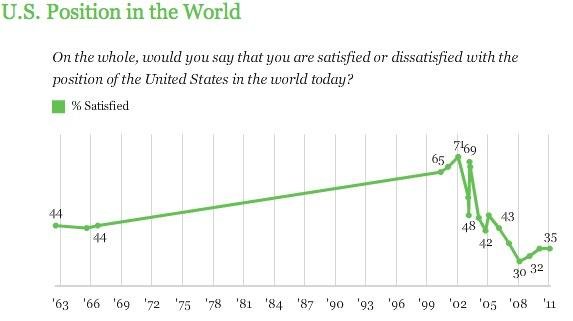
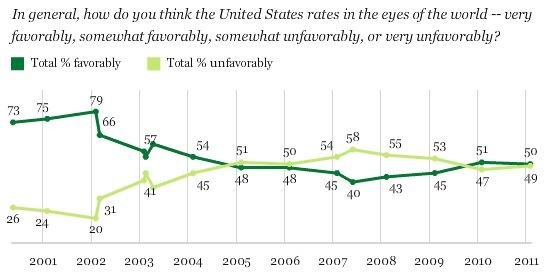
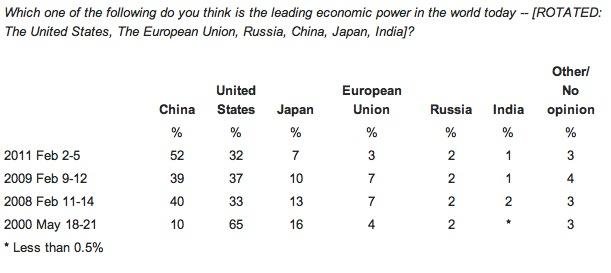
Appendix 2
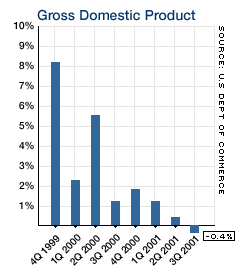
Appendix 3
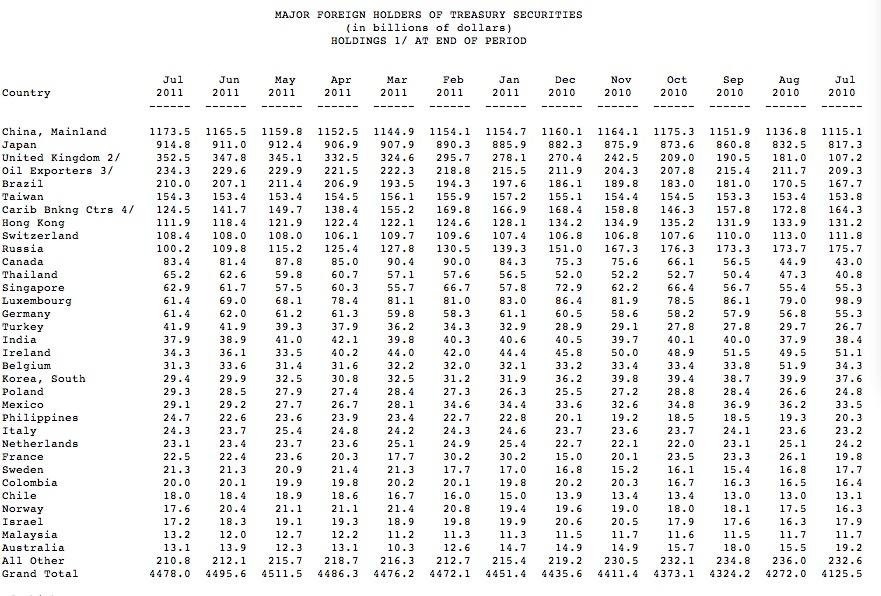

Appendix 4
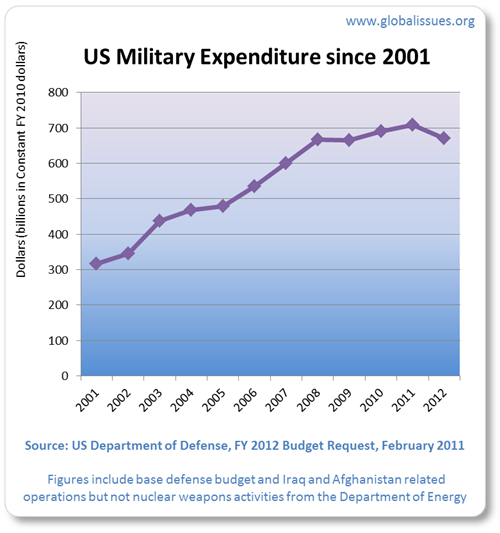
References
Amadeo, K. 2011. ‘China’s economy is strong’. Web.
Byman, D. L. 2009. ‘Do targeted killings work?’ Brookings. Web.
CNN Money. 2001. US economy shrinks: Third-quarter GDP was negative, but better than analysts expected. Web.
Daily Mail, 2011. The true cost of the war on terror: $3.7 trillion and counting… and up to 258000 lives. Web.
Duncan, R., Jancar-Webster, B., & Switky, B. 2009. Power in world politics. In: Duncan, R., Jancar-Webster, B., & Switky, ed. World Politics in the 21st century. Boston: Houghton Mifflin publishing company.
Gallup, 2011. US position in the world. Web.
Global Issues, 2010. World military spending. Web..
Greenemeier, L. 2011. ‘The drone wars: 9/11 inspired advances in robotic combat’. Live Science. Web.
Hinshaw, D. 2011. ‘Chinese yan’s new global challenge to the dollar’. The Christian Science Monitor. Web.
Joffe, J. 2009. ‘The default power: The false prophecy of America’s decline’, Foreign Affairs, vol. 88.
Johnson, S. C. 2011. ‘S&P threatens to cut U.S. credit rating on deficit’ Reuters. Web.
Klare, M. 2011. ‘America and oil declining together’. Wamm Today. Web.
Miley, J. 2011. ‘The economy before and after 9/11’. MSN Money . Web.
OECD, 2004. OECD finds that China is biggest exporter of Information Technology Goods in 2004, surpassing US and EU. Web.
Pollack, J. 2007. ‘Chinese military power: What vexes the United States and why?’ Foreign Policy Research Institute. Web.
Quinn, A. & Stewart, P. 2011. ‘US risks losing ‘Arab Spring’ opportunity: Clinton’. Web.
Rachman, G. 2011. ‘Think again: American decline’. Foreign Policy. Web.
Schmitz, P. 2011. ‘How 9/11 triggered America’s decline’. Spiegel Online International. Web.
Shanker, T. 2010. ‘Pentagon cites concerns in China military growth’. The New York Times. Web.
The West Australian, 2011. China locked in to buying US debt. Web.
US Department of the Treasury, 2011. Major foreign holders of treasury securities (in billions of dollars). Web.
Wu, Y. 2004. China’s economic growth: A miracle with Chinese characteristics. Routledge Curzon: London/New York.